 Close Topic Options
Close Topic OptionsTai Chi
Tai Chi - Movies, Music, Fashion, Sports - Posted: 29th Jul, 2017 - 8:33pm
Tai Chi
Practicing tai chi reduces risk of falling in older adults
Researchers have compared the effects of tai chi to leg strengthening exercises (A physical therapy called 'lower extremity training,' or LET) in reducing falls. After six months of training, people in the tai chi group were significantly less likely to experience an injury-causing fall than were people in the LET group. Ref. Source 3o
Image from Wikimedia public domain.

Tai Chi (Hover)
Chi Tai
I've been practicing Tai Chi for about a year to relieve neck pain from a vehicle accident. We turned end over end three times and landed on the passenger side where I was sitting. I have had chiropractic help and medication, but nothing helped anywhere near as much as Tai Chi. In fact, I learned that I've been practicing aspects of Tai Chi for decades without knowing. The primary benefit is longevity and whole body health, but there are certainly combat applications, mostly not being thrown down, thrown off balance, or lifted off your feet. There are also significant leverage techniques for doing damage when pressed.
Chi Tai
I've always seen small Tai Chi groups outdoors moving in a very slow rhythmic manner. Is it always like that, moving very slow?
Tai Chi
Tai chi significantly reduces depression symptoms in Chinese-Americans. A new study finds that a 12-week program of instruction and practice of the Chinese martial art tai chi led to significantly reduced symptoms of depression in Chinese-Americans not receiving any other treatments. Ref. Source 6z.
Tai Chi
The purpose of the slow movement of Tai Chi is to prefect the movement. Once you have the movement perfected from lots of practice when you need it you know the move inside and out and can preform it at a much greater speed to achieve the end result. The slow movements can be a good work out as you keep your body stiff and ready. Many people have stated that this helps them get better balance and flexibility in their movements.
 TOPIC: Tai Chi
TOPIC: Tai Chi